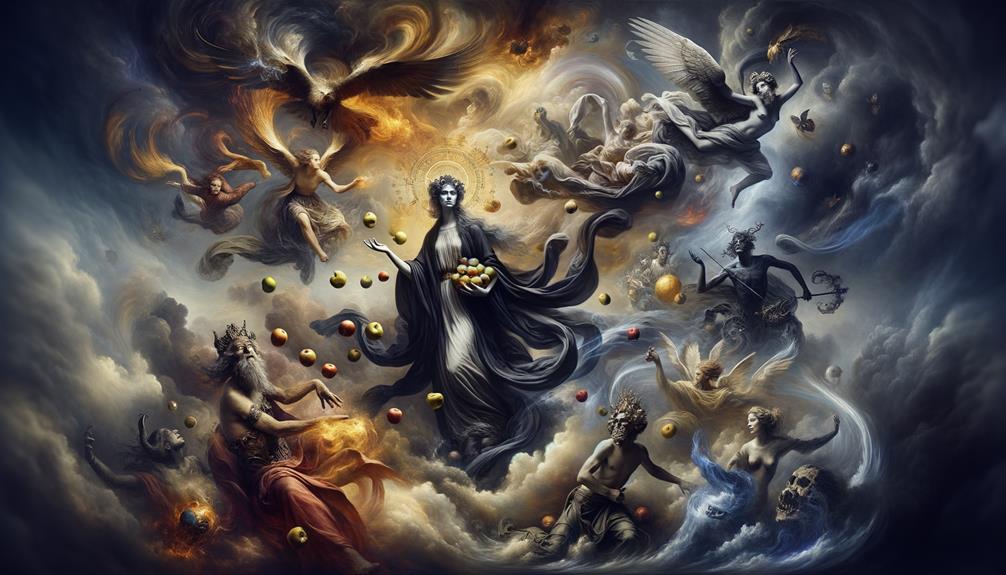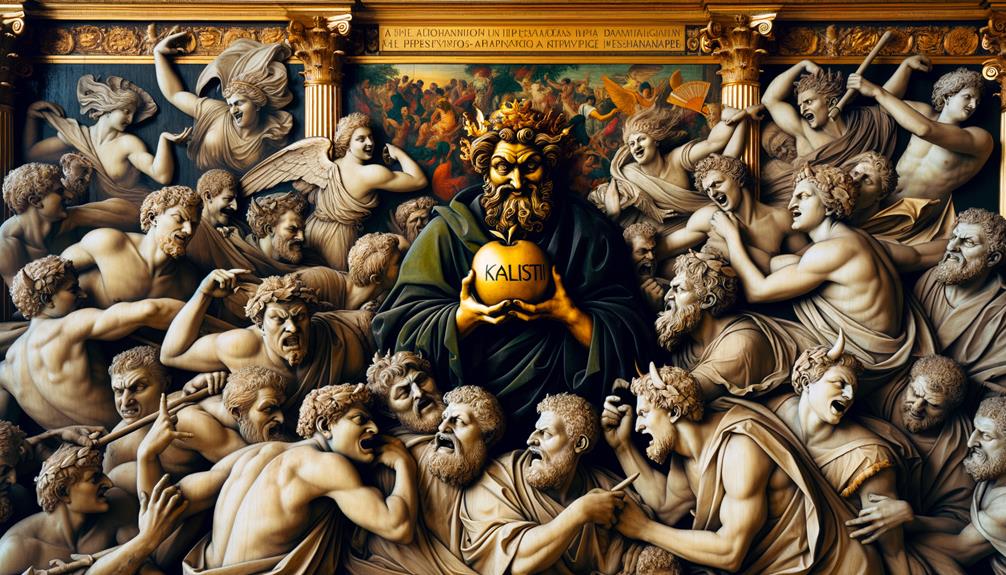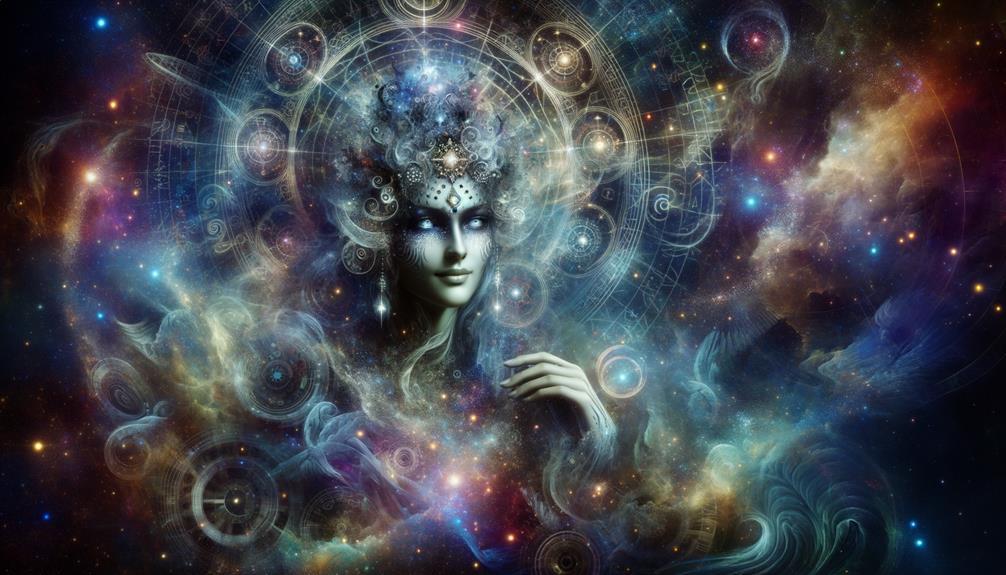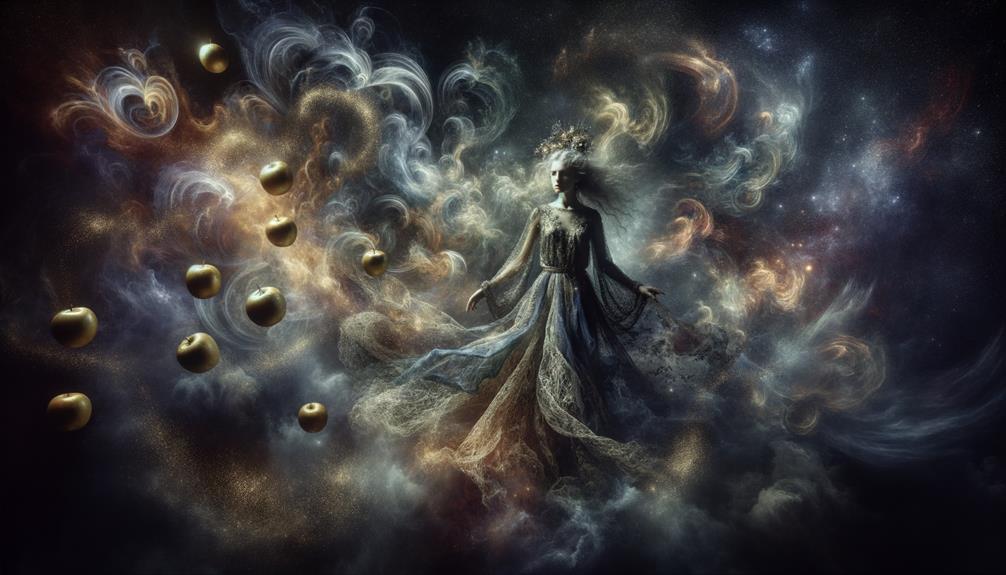Eris, the Greek goddess of discord, played a pivotal role in countless myths. Whether born from Nyx (the night personified) or Zeus and Hera, her actions sparked chaos. The infamous golden apple she tossed at Peleus and Thetis' wedding ignited the Trojan War – symbolizing ego, desire, and inevitable conflict. Depicted wielding war weapons, her imagery underscores her role as an instigator of battles. Her legacy resonates through modern narratives, bridging ancient strife with contemporary culture. By examining Eris's journey from primordial darkness to divine meddler, we uncover deeper layers of myth and meaning.
Origins and Family
Eris's origins spark differing tales. Some myths depict her as Nyx's daughter, the primordial goddess representing night's darker realms. This ancestry aligns Eris with primal chaos and strife woven into the universe's fabric. Other accounts claim Zeus and Hera, the divine rulers, bore Eris, placing her amidst the Olympian family dynamic.
As Ares's sister, the god of war, Eris often walked battlefields with him, symbolizing conflict's omnipresence. Whether emerging from Night itself or born to the king and queen of gods, Eris's multi-faceted parentage reflects discord's complex, enduring role in mythic narratives.
Mythological Roles

Eris earned notoriety as the spark igniting chaos, sowing seeds of conflict rippling through both mortal and divine realms. The Greek goddess of strife and discord reveled in fueling tensions, her meddling evident in the Judgement of Paris – the fateful event kickstarting the Trojan War. Her golden Apple inscribed 'To the fairest' incited a vicious rivalry between Hera, Athena, and Aphrodite, ultimately leading Troy to ruin.
Eris embodied disruption itself, showing up uninvited wherever harmony reigned. At Peleus and Thetis' wedding, she tossed the Apple among guests, sparking a dispute echoing through history. Her Roman counterpart, Discordia, represented the innate conflicts within human nature and society.
Eris thrived on shattering unity, her very presence a harbinger of turmoil. Wherever solidarity took root, she arrived to uproot it, leaving discord in her wake. This penchant for mayhem cemented her legacy as the catalyst of conflict in Greek mythology.
The Golden Apple Incident

Rolling the golden apple into the celebration, Eris sparked a fierce rivalry among the goddesses, showcasing the destructive power of jealousy and ambition. At Peleus and Thetis' wedding, Eris, the Greek goddess of discord, introduced a golden apple inscribed 'For the fairest.' This act ignited a fateful contest between Hera, Athena, and Aphrodite, each embodying Eris's chaotic nature.
Eris forced Paris, a Trojan prince, to judge the fairest goddess. Promises and bribes followed, with Aphrodite offering Paris the love of Helen, the most beautiful mortal woman. Ultimately, Paris awarded the apple to Aphrodite, kickstarting events that led to the Trojan War.
The golden apple incident symbolizes:
- The inevitable clash of divine egos.
- The peril of human choices influenced by divine manipulation.
- The endless cycle of desire and conflict.
- The catastrophic outcomes of seemingly minor acts of discord.
Depictions in Art

Moving past the golden apple's aftermath, it's intriguing to witness how artists have captured Eris, the goddess embodying strife and discord in Greek mythology. Visual representations often depict her as a menacing figure, brandishing weapons amidst tumultuous battle scenes. These artworks underscore Eris's role as a catalyst for turmoil and rivalry, immortalizing her disruptive nature.
Artists emphasize Eris's ability to sow chaos, portraying her presence amid warfare and clashing armies. This symbolism serves as a stark reminder of the dangers inherent in jealousy and rivalry – hallmarks of her influence. Through these dramatic visuals, Eris transcends her narrative roots to become a symbolic representation of discord's enduring impact.
These artistic interpretations highlight Eris's significance beyond a mythological character. The vivid portrayals reinforce her role as a harbinger of conflict, capturing the perpetual dance between harmony and chaos in a compelling visual form.
Influence on Culture

Eris's cultural impact transcends ancient myths, echoing through modern narratives and symbols. The catalyst for chaos in the golden apple tale has inspired literary characters like Maleficent and celestial names, embodying discord's enduring influence across time.
Ancient Mythological Impact
Eris' pivotal role in stirring up trouble through the infamous Judgement of Paris event cemented her lasting impact on Greek cultural tales and artwork. The History Encyclopedia vividly recounts how her inscribed "To the fairest" Apple of Discord sparked a beauty contest among goddesses Hera, Athena, and Aphrodite at Peleus and Thetis' wedding. When Paris named Aphrodite the fairest, the tragic Trojan War ensued.
Eris' Greek myth stands as a cautionary fable about the destructive forces of envy and strife. In Roman belief systems, she closely aligned with Enyo, the wicked goddess of war and upheaval.
Her disruptive influence echoed across ancient societies, inspiring:
- Artistic depictions of Paris' fateful judgment, a popular classical art theme.
- Literary works exploring the Trojan War's devastating aftermath.
- Rituals and festivals acknowledging divine intervention's dual nature.
- Philosophical examinations of discord and harmony's societal roles.
This age-old narrative's enduring resonance spotlights humanity's perpetual struggle between chaos and order.
Modern Cultural References
The ancient Greek myth of Eris, the goddess who stirred discord among the gods, resonates in our modern world through diverse cultural references and fresh interpretations. A prime example is the naming of the dwarf planet Eris in 2006, recognizing her cosmic influence even in the furthest reaches of our solar system. This celestial body encapsulates Eris's essence as an instigator of chaos and strife.
Robert Shea and Robert Anton Wilson's 'The Illuminatus! Trilogy' draws upon Eris's anarchic spirit, fueling intricate conspiracies and challenging societal norms. The trilogy's embrace of discord mirrors Eris's mythical role as a provocateur, prompting readers to question the status quo.
Contemporary works like Disney's 'Sleeping Beauty' feature characters akin to Eris, such as Maleficent, who disrupt harmony to expose underlying tensions. These modern interpretations explore discord as a catalyst for transformation, reflecting our evolving perspectives.
The 1960s counterculture movement birthed Discordianism, a philosophy venerating Eris as a deity of chaos, celebrating her unpredictable nature. Through such cultural touchstones, Eris endures as a symbol bridging ancient myth with our modern understanding of conflict and change.
Eris in Modern Contexts

Eris's influence endures in our modern world through the chaotic Discordian philosophy and the dwarf planet bearing her name. Discovered in 2005, this celestial body symbolizes her cosmic presence, mirroring the mythological goddess of discord herself. More compelling is Discordianism, a 1960s counterculture movement venerating Eris. Their quirky holy text, Principia Discordia, playfully celebrates chaos through humor – an ode to Eris's essence.
Her impact radiates into art and literature too. Maleficent from Sleeping Beauty embodies Eris's archetype of strife and disharmony. Such modern interpretations underscore her cultural relevance today.
- Dwarf Planet Eris: Her astronomical influence persists.
- Discordianism: An eccentric belief system revering Eris.
- Principia Discordia: Satirical scripture exalting chaos and mirth.
- Artistic Depictions: Characters like Maleficent channel Eris's discord.
Transcending time, Eris's chaotic spirit sparks fresh narratives and perspectives. Her modern resonance reveals the timeless allure of disruption, inviting deeper contemplation on its role in our lives.
Frequently Asked Questions
Is Eris the Goddess of Discord?
Eris embodies chaos and conflict – her influence disrupts harmony, often propelling heroes into riveting journeys that unveil deeper universal truths. In Greek myths, she instigates legendary clashes like the Trojan War, her mythical role representing upheaval and discord that test characters' mettle. Through the turmoil she precipitates, hidden qualities emerge, and profound insights arise from navigating disruptive forces. Eris's essence personifies how upheaval, though chaotic, can catalyze transformative growth and revelations.
Who Is Eris Goddess of Discord in the Trojan War?
Eris, the goddess of discord, ignited the Trojan War's chaos by gifting Paris the golden apple. His choice of Aphrodite over Hera and Athena symbolized the strife that would engulf Troy. This pivotal moment launched the legendary conflict that saw heroes rise and an ancient city fall.
Why Did the Evil Goddess of Discord Eris Decide to Cause Trouble?
Eris embodied life's inevitable chaos and upheaval. Her disruptive antics propelled heroes and gods on transformative journeys, fostering growth through conflict. She unveiled deeper truths concealed beneath the superficial by sowing seeds of discord.
What Is the Myth of Eris and the Apple of Discord?
The myth of Eris and the Apple of Discord sparked major conflict. By stirring up jealousy among goddesses, Eris's actions ignited events leading to the Trojan War, showcasing discord's devastating impact.


